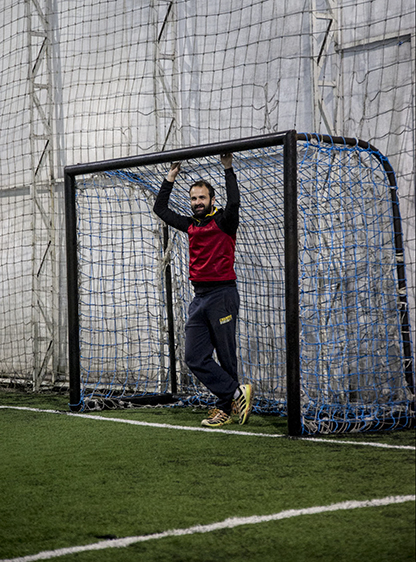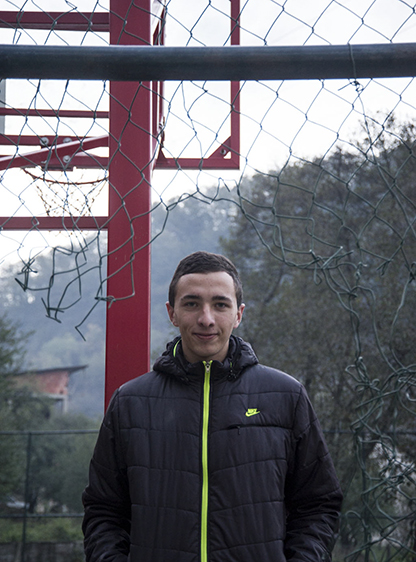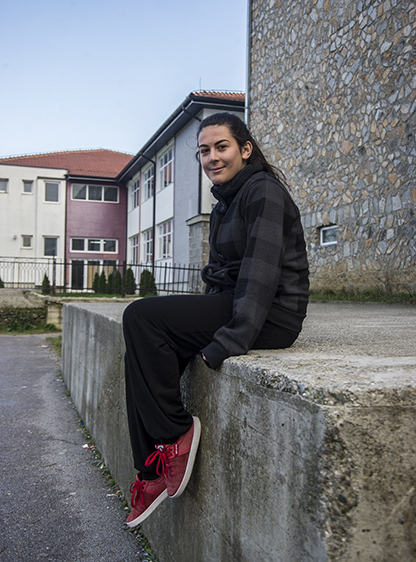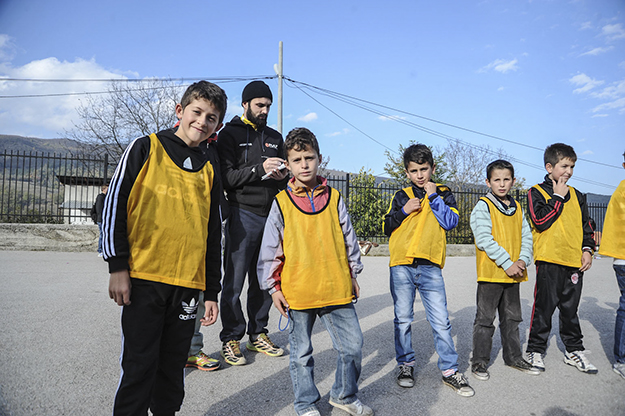In November, Thibault Suisse, a 28-year-old French project manager from Sports Sans Frontieres — an organization that uses sports as a tool for integration — visited the southern Kosovo towns of Shtime and Kacanik to review their local coordinators. When they arrived, however, they found out that an unknown number of the kids they were supposed to work with had vanished.
“[They were] just gone, disappeared; from one day to another they just left,” Suisse says, while smoking a cigarette at the organization’s humble, sports equipment-filled offices in Prishtina. The missing youngsters that made the news that weekend were among the passengers of those buses that leave the outskirts of the Kosovar capital in the middle of the night. Their goal? To (illegally) reach Hungary through Serbia, leaving everything behind to start a new life in the EU — or at least that’s the traffickers’ promise.
Operating in such an environment — one that sums up the consequences of a decade of conflict in the 1990s that ended in war only 15 years ago — the ethnic divisions within Kosovo are just one of many difficulties that make Suisse’s (and Sports Sans Frontieres’) work so essential and intricate.
Sports Sans Frontieres was established in Prishtina in 2008 and now works in 12 Kosovo regions, and with six different ethnic communities: Albanians, Serbs, Bosniak, Roma, Ashkali, and Turks. In 2014, the organization had 88 volunteers between 18 and 25 years of age who assume different leadership positions to coordinate weekly games for young kids in their hometowns.
The organization calculates that around 10,000 kids from different ethnic communities take part in the activities, and they have managed to form interethnic groups in eight cities. Even in the most remote Kosovo school, one will find students playing with one of the 22,800 indestructible yellow balls that the organization has distributed throughout the country.
Recently, Sports Sans Frontieres won the One World Award in the category of Sport for Conflict Resolution after competing for the distinction with 300 other international projects from all over the world. Those are the numbers, but the everyday reality is more convoluted; it is a labyrinth with high and forbidding walls.
On a cold Saturday morning in November, Suisse drives us to the town of Tuneli i Pare, just outside Mitrovica. On our way, we see a woman throwing a bag of trash into the river where garbage blocks the flow of water. There is also garbage all around the small sports court at the entrance of town. The court features torn fences, damaged basketballs and netless goals.

Thibault Suisse, a 28-year-old former project coordinator with Sports Sans Frontieres, spent most of his time visiting volunteers and kids in villages across Kosovo, often acting as a psychologist and negotiator.
It is here that Armend, 18, starts leading warm-up exercises with a group of about 20 kids. His whistle is like the Pied Piper of Hamelin’s flute, and the flow of kids (some still in their pajamas) arriving in the court from the often unfinished houses surrounding the field is continuous. They are all Albanian.
Aurel Tahiri is the 18-year-old Milanista who serves as the charismatic leader of this locality’s group of coordinators. According to Tahiri, five years ago there were ethnic Ahskali families living in Tuneli i Pare, but not anymore. “They were told they didn’t belong here,” he says. “They were discriminated against and so they left.” The exchanges hosted by Sports Sans Frontieres are his only chance to meet people from other Kosovo communities.
He sees his volunteer work with the village kids as a chance “to get away from the problems of the street, and also to protect the kids from them.” He wants to become a physical education teacher. His friend Leon, an animator on the court, is wearing a red T-shirt featuring the Albanian eagle. It’s from the Torcida fans club.
“We had a talk about symbols,” says Suisse. “It’s just a provocation, and they don’t understand why it is important to avoid these things.” The organization made it clear since the beginning that political talks are something best avoided. Religion, however, is a more acceptable topic: A few times a year, Sports Sans Frontieres organizes cultural visits with all its volunteers to places ranging from the Decani Monastery to swimming pools. For many, says Suisse, these occasions are the first times they leave their village.
Serbia vs. Albania: The most contentious match
Only a few months ago, after the abandoned football match between Serbia and Albania on Oct. 14, the organization saw itself heading backward due to the amount of nationalistic behavior and messages that its volunteers were both sharing on Facebook and bringing to the activities they do across Kosovo. “This game has been like going six months backward,” says Estelle Maitre, head of mission of Sports Sans Frontieres in Kosovo. It didn’t take long before the insults began to appear.
Before the infamous match, says Maitre, a precedent appeared. In May 2014, the storm called Yvette caused 51 casualties in Serbia and necessitated the evacuation of more than 30,000 people. “An Albanian volunteer posted a photo on Facebook of a flood victim and said that that is what Serbs deserve because of the war in Kosovo,” Maitre says.
The post sparked numerous reactions and accusations, especially among certain Serb and Albanian volunteers. These volunteers often find Facebook to be a very important network where their ethnic and even linguistic differences are diminished by technology. “Facebook is private,” says Suisse, “but there are many volunteers and also kids in the network, and they have to care about the image they give.”
The day after a drone flew over the Partizan Stadium in Belgrade carrying a “Greater Albania” flag (ending the match and prompting a rush of violence both in the stands and on the field), a Serbian volunteer posted an image of Albania’s national team fleeing toward the changing rooms for protection and accused them of being cowards. Again, the vast group of teenagers got into a heated dispute and exchanged an endless series of accusations amid pleas from other volunteers to stop fighting for the good of the network.
Whoever put that drone in the sky could not have known the extent of its consequences.
In the southern town of Shterpce, near the Macedonian border, the red, blue and white colors of the Serbian flag wave above the municipality. Sports Sans Frontieres works with two groups there, one Serbian and one Albanian. They are not mixed, though that was the intention before the Belgrade match. “For me, it’s not a problem,” says, Nikola Bozilovic, a 17-year-old Red Star fan and the only Serbian volunteer that the organization managed to engage in this town, “but kids won’t come — they don’t want to collaborate, to be together.”

Nikola Bozilovic, 17, is the only ethnic Serb volunteer that Sports Sans Frontieres persuaded to keep working in Shterpce, a Serb-majority town. Others refuse the inter-ethnic approach.
When he started, his friends quit volunteering: “One left because her boyfriend wouldn’t allow her to come, and another one because he was too patriotic and didn’t want to mix with other communities, as this is the philosophy of Sports Sans Frontieres.”
Bozilovic and all the other kids wore T-shirts featuring nationalistic Serbian messages after the Albania-Serbia match. “Imagine if we had a mixed group,” says Suisse. For a few weeks after the infamous game, Albanian kids in Shterpce weren’t allowed to board school buses in town. “Some children [in the Albanian-inhabited village of Firaje] were being intimidated, so they had to walk,” says Osman Mani primary school director Ganimete Xhemajli.
At this center, Sports Sans Frontieres works with the Albanian group. Some of the children live up to five kilometers away from the school. Xhemajli is in her late 50s, and has suffered more than intimidation on the bus: “With the problems we had in the past, I think it’s time to move forward,” she says, smiling. Later on, Suisse points out that older people are more positive toward the group’s interethnic project.
Arlinda Hyseni is a tough young woman of 17 who learned Serbian working at her father’s DIY shop in Firaje, just a few kilometers from Shterpce. She is the leader of the Albanian group activities in this part of the country. “My parents and my brothers say what I’m doing is stupid because older and smarter people tried to do it and didn’t manage,” she says, adding that previous attempts failed “to either give something new to the Albanian kids [or to] work with both, Albanian and Serbian.”
A young father named Afrim greets his son from the other side of the schoolyard fence on his way home. When he sees Suisse, he stops to express his gratitude. “I’m a taxi driver and I come and go every day,” says Afrim. “Here there is not any perspective for the youth; if my son wasn’t here he would just be in front of the TV.”

Arlinda Hyseini, 17, leads a group of kids every Wednesday in Firaje, an Albanian village within the Serb municipality of Shterpce, in which the organization aims at having an ethnically mixed group in the future.
Hyseni — who is the leader of the group and wants to become a lawyer — has already asked a few parents whether they would accept mixing the group from Firaje with the Serbian children from Shterpce. “Some agreed but some said that they would not bring the kids because we cannot guarantee their security,” Hyseni says before adding that she will not give up: “We will have to convince them.”
On the other side of Kosovo, in the Bosniak neighborhood near the Iber River that divides the city of Mitrovica, father of two Mirsad Pazari seems to have a different experience, though his life has been marked by mixture. A technician for the PTK telecommunications company, he lives in North Mitrovica and works in the South. His wife’s father was Albanian, and her mother was Serb. In the beginning, they brought their eldest daughter to a school in the Bosniak system, but after seeing that there were only two other students in the class, they changed their minds and brought both of them to another school where they would learn with Albanian kids. Before the war, he was fired, and while he was exiled in Germany he received a call to work in the South after the war.

The organization focuses on activities that promote gender equality and gender integration, with no special differences or treatments when boys and girls play together.
When asked if it’s possible to see kids from different communities together without it being some sort of special or contrived case, he is convinced. “These kids don’t know what war is, and they don’t know about the past,” he says. But parents do. What’s their role in all this, we ask? “Maybe they will see that some bring their kids, and that nothing happens,” he says. “Without this organization, this wouldn’t happen because people don’t do this here.”
From economic stability to ‘social calm’
Fahri Jashari is the civil society coordinator for the municipality of Mitrovica and has worked since 2008 with Sports Sans Frontieres. Jashari agrees with other municipality representatives that so long as economic problems persist, issues of social cohesion difficulties will do so as well.
“Before, we had the Trepca giant,” says Jashari, referring to a large regional mine that has been practically inactive since 1999. It used to employ more than 20,000 workers and once accounted for 70 percent of Kosovo’s gross domestic product. “Now the whole Mitrovica region is one of the poorest in the country and very little has been invested, but we can see some perspective returning because we transformed Mitrovica from an industrial to a university city.”
He complains that the media has portrayed his city as a place of ethnic division, and points to the frequent exchanges on both sides of the bridge, emphasizing the changes wrought by the new Diakonia Youth Center. “It is a center that has managed to bring together youth from all communities in one place … Albanians, Serbs, Turks, Roma, and have organized activities that are complementing integration and multi-ethnicity very well, with no incidents,” he says.
Valdet Shoshi is a 52-year-old former football coach who is responsible for sporting activities in the city of Peja. Shoshi says that economic stability would give young people social calm and security, and says that the ever-present question of EU integration has caused hopes to rise too high.
“We expected a lot more,” Shoshi says, “and if we were members of international federations in every respective sport, then governments would invest more, and the youth would see more perspectives.” He says that Sports Sans Frontieres, with its donation of 900 balls, has done more for Peja than the government has in 15 years.
In the past, Shoshi worked at the Leather and Shoe Combine, the oldest industrial plant in Peja, founded in 1959. “The factory was privatized for very little money,” the ex-coach explains, “and I think a privatization level like Kosovo’s is a failure — more people could be employed, and this affects youth unemployment as well.” The rate of youth unemployment in Kosovo is over 55 percent. While there are few jobs, Kosovo’s Internet penetration rate exceeds 76 percent, one of the highest rates in Europe, according to a Kosovo Association of Information and Communication Technology report. The virtual world or moving abroad seem to be the favored options for the young.
“Technology is killing us,” says Xheneta Maliqi, an 18-year-old law student from Kamenica who has seen the transformation of her town’s social spaces from physical to cybernetic, at least for her age-mates. She is now the leader of Sports Sans Frontieres’ most successful chapter in Kamenica. There, children from adjacent Serbian and Albanian schools never shared the yard between the two buildings until Sports Sans Frontieres proposed the idea to the directors, who agreed. Albanian, Serbs and Roma children now share the yard.
Despite the success in Kamenica, where Maliqi says that relations between both communities are historically more fluid (even among her parents’ generation), she remains convinced that in 15 years, schools will be still separated by ethnicity.
“Before,” Maliqi says, “we had a youth center where Serbs and Albanians would do things together, from English or cooking lessons to playing pingpong —it was always full of people. But it closed a year and a half ago, so now youngsters just drink coffee all day or [hang out on] social media — there is not really a free place where they can converge.”
Following Suisse and Maitre at work at Sports Sans Frontieres (together with their translators), one realizes that they often become psychologists as they negotiate with the fragile beings who will compose Kosovo’s future. After a year of working with the same children, the kids don’t cheat any more when the monitor is not looking at them, they stop counting the points of the game to see who wins and the Roma kids don’t feel discriminated against when they don’t get the ball passed to them at school in Mitrovica (nor do their parents).
Before solving the problem of ethnic division, they encounter basic problems rooted in poverty and a lack of both education and infrastructure — whatever the community. Meanwhile, donors are mainly attracted to high profile, “inter-ethnic” projects, which can leave these more foundational problems unaddressed while the fear of the stranger grows.
“This is the most important part,” says Suisse, after a tense negotiation to defuse an organized fight between two grown-up volunteers over one’s cursing of the other’s dead relatives (both were Albanian). “Many times,” says Suisse, “they have the same problems: pride, low self-esteem … teenagers.”
As they both had supporters on their sides, the two 18-year-olds decided to reconcile and affirmed that they did so only to keep the harmony of the 88-volunteer network. Suisse, who used to work for the pedagogical program of a swimming pool back in France, puts it clearly in words that could well be a metaphor for society.
“Sports Sans Frontieres is not a brand; it’s a team, and I think that’s the key: the feeling to be part of something. If you don’t have this, you don’t have a network any more.”

